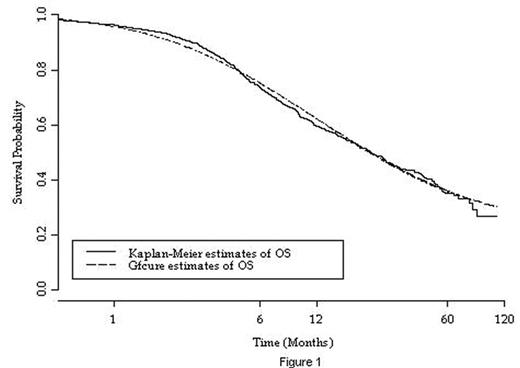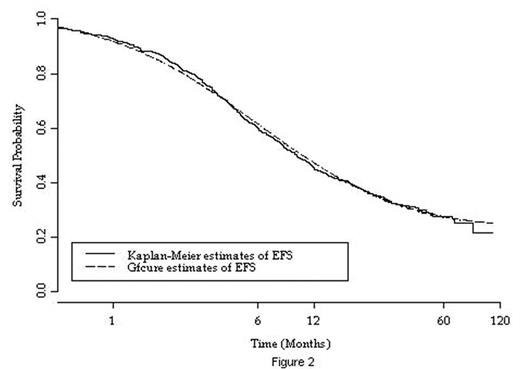Abstract
This report updates a retrospective study from SFGM-TC registry concerning 1108 patients who underwent allogeneic hematopoeitic stem cell transplantation (HSCT) after reduced intensity conditioning (RIC) from HLA identical siblings (84%) and unrelated donors (16%) for hematological malignancies. At time of conditioning, 442 patients were in CR, 337 in PR, 107 in stable disease (SD) and 222 in progressive disease (PD). As conditioning, 255 patients received fludarabine and TBI (2 grays), 465 patients fludarabine, busulfan and ATG and 388 patients an other regimen. After transplant, 336 patients (30%) developed an acute GVHD ≥ grade II (grade II: 178, III: 80 and IV: 78). A chronic GVHD was present in 388 patients (35%) (185 limited and 203 extensive). With a median follow-up of 30 months, the 3 and 5-year probability of overall survival (OS) were 43.5% (40–47) and 32%(29–35) respectively and the 3 and 5-year probability of event-free survival (EFS) were 35%(31–39) and 28% (24.5–31) respectively. The TRM at 1 year, 2 years and 3 years was 15% (13–17), 18% (15.5–21) and 20% (17–23). A mixture model, gfcure with Splus statistical package determined the percentages of long-term survivors and its adequacy was verified graphically. The probability to be a long-survivor was 24% (17.5–32.5) (Fig.1) and to be a long event-free survivor was 23% (19–28) (Fig. 2). The multivariate analysis has tested recipient and donor age, disease status pre-transplant, number of transplants before RICT, HSC source, sex matching, HLA matching, CMV status and ABO compatibility. The only factor which had a significant impact on long-term survival after RICT was the disease status just prior conditioning: PR versus CR: HR: 3.63 [1.14–9.18] p<0.001 and PD versus CR: HR: 4.35 [2.22–8.51] p<0.0001. In conclusion, these updated data demonstrate that allogeneic HSCT after RIC was able to possibly cure 23% of patients with haematological malignancies and the most important factor to take into account remains to be in CR pre-transplant.
Author notes
Disclosure: No relevant conflicts of interest to declare.



This feature is available to Subscribers Only
Sign In or Create an Account Close Modal